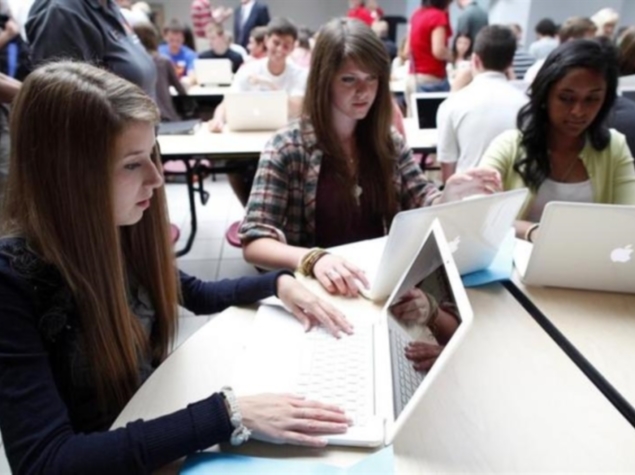- Home
- Internet
- Internet News
- Hackathons Take on Islamic State in Cyberspace Battle
Hackathons Take on Islamic State in Cyberspace Battle

The extremists' ideology and use of social media has struck a chord with thousands of youngsters across the world, drawing them to fight in Iraq and Syria or show support from their home countries.
The United States and its allies have struggled to counter the digitally savvy group, but a pair of Silicon Valley entrepreneurs are leading a grassroots-charge to take on IS in cyberspace, travelling around the world to host hackathon challenges.
The latest hackathon competition the fourth in the past five months is being held alongside a two-day countering violent extremism conference in Australia's biggest city, attended by high-level officials and experts and opened by Prime Minister Tony Abbott.
The anti-extremism meeting is taking an in-depth look at how IS which controls large swathes of territory in Iraq and Syria reaches out to youths, with technology giants Facebook, Twitter and Google joining the more than 30 participating countries in hashing out solutions.
(Also see: Australian Talks Tackle Jihadists' Use of Social Media)
Almost 25,000 foreign fighters from over 100 countries were involved in jihadi conflicts worldwide, a recent United Nations report said, with many headed for Iraq and Syria. Some of those making the journey include teenage boys and girls.
The hackathon is designed to take an additional approach to countering IS.
"We marry innovation and the national security sector, with Silicon Valley ethos and start-up models to try and create very new, fast-paced, high-energy (projects)," said hackathon organiser Quintan Wiktorowicz, who was US President Barack Obama's senior adviser for countering violent extremism from 2011 to 2013.
"No single prototype is a silver bullet to stop ISIS radicalisation. But it's the ecosystem that we're building by running these (hackathons) globally and connecting the networks all the time," he told AFP, using another term for IS.
"Over five years, it can be a game changer, it can have strategy impact."
The projects being developed do not have to address radicalisation head on, but are meant to focus on the root causes of why young people choose to leave home, such as feeling disconnected from local communities.
Extreme heroes
Hackathon competitors are drawn from across industries and communities that may not normally interact with each other, with a goal to go beyond the talking shop labels usually slapped on conferences and come up with concrete programmes that can turn a profit.
At a three-day "Haqqathon" a variation on the word hackathon using the Arabic word "haqq", which means truth in Abu Dhabi in April, the people's choice award went to "Marhubba", an app which helps young Muslims tap into Islamic scholarship to answer questions about sex and intimacy.
Silicon Valley entrepreneur Shahed Amanullah, who co-founded start-up incubator Affinis Labs with Wiktorowicz, said IS was "speaking to a vacuum that exists in Muslim youth identity".
"It's giving them an exciting, empowering path to express their identity. We are not doing that on our side," Amanullah said.
"We can't just say what they are doing is not Islam, we have to say what is Islam and explain that in a way that makes them feel good."
Yassmin Abdel-Magied, a drilling engineer, was working with Matthew Quinn, a counter-terrorism specialist and animator Caitlin Bathgate to create an app called "Connect Me" that she describes as a "Tinder for mentorship".
Like the online dating app Tinder, Abdel-Magied, 24, is hoping strangers can forge links based on their interests.
At the same desk, Abdullahi Alim, 22, who has a background in finance and statistics, is working with his team on a social media campaign called "Extreme Heroes".
"We're looking to give young Muslim teens who don't have a positive or an active Muslim role model in their life access to non-violent male leaders in their own community to give them a constructive identity," Alim said.
Results of the Sydney hackathon, which could include potential funding to develop projects, were due to be announced later Friday.
Anne Aly, an Australian counter-terrorism expert and hackathon co-organiser, is passionate about developing grassroots measures away from governments' top-down anti-terrorism narratives.
"I think showing the world, and Australia and the region, that we can bring civil society together to come up with solutions is in itself a very strong message," Aly said.
Catch the latest from the Consumer Electronics Show on Gadgets 360, at our CES 2026 hub.
Related Stories
- Samsung Galaxy Unpacked 2025
- ChatGPT
- Redmi Note 14 Pro+
- iPhone 16
- Apple Vision Pro
- Oneplus 12
- OnePlus Nord CE 3 Lite 5G
- iPhone 13
- Xiaomi 14 Pro
- Oppo Find N3
- Tecno Spark Go (2023)
- Realme V30
- Best Phones Under 25000
- Samsung Galaxy S24 Series
- Cryptocurrency
- iQoo 12
- Samsung Galaxy S24 Ultra
- Giottus
- Samsung Galaxy Z Flip 5
- Apple 'Scary Fast'
- Housefull 5
- GoPro Hero 12 Black Review
- Invincible Season 2
- JioGlass
- HD Ready TV
- Laptop Under 50000
- Smartwatch Under 10000
- Latest Mobile Phones
- Compare Phones
- OnePlus Turbo 6V
- OnePlus Turbo 6
- Itel Zeno 20 Max
- OPPO Reno 15 Pro Mini 5G
- Poco M8 Pro 5G
- Motorola Signature
- Vivo Y50e 5G
- Vivo Y50s 5G
- Lenovo Yoga Slim 7x (2025)
- Lenovo Yoga Slim 7a
- Realme Pad 3
- OPPO Pad Air 5
- Xiaomi Watch 5
- Huawei Watch 10th Anniversary Edition
- Acerpure Nitro Z Series 100-inch QLED TV
- Samsung 43 Inch LED Ultra HD (4K) Smart TV (UA43UE81AFULXL)
- Asus ROG Ally
- Nintendo Switch Lite
- Haier 1.6 Ton 5 Star Inverter Split AC (HSU19G-MZAID5BN-INV)
- Haier 1.6 Ton 5 Star Inverter Split AC (HSU19G-MZAIM5BN-INV)
















